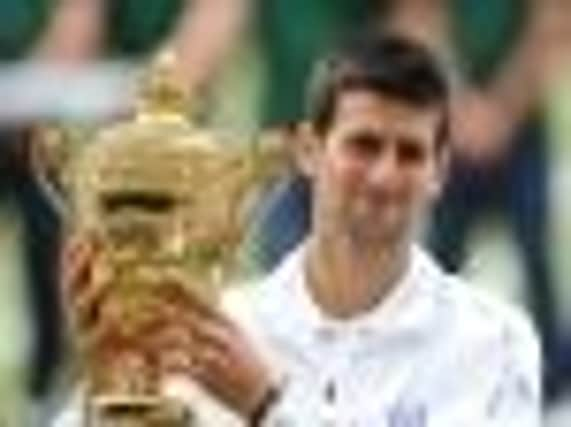Men’s draw appears as predictable as the women’s is uncertain


Not because the Argentinian is likely to lift the famous cup in SW19 next month.
He is not, although Del Potro’s return to form after battling injury means he cannot be ruled out.
Advertisement
Hide AdAdvertisement
Hide AdDel Potro is relevant because he is the only player, other than Roger Federer, Rafael Nadal and Novak Djokovic, to win a tennis grand slam in the last 29 major tournaments.
Del Potro won the 2009 US Open, beating Federer, but before that you have to go back to Russia’s Marat Safin in January 2005 at the Australian Open to find a men’s grand slam winner outside the big three in tennis.
That statistic is testimony to the dominance these past seven years of three of the best players ever to pick up a tennis racket.
Federer, Nadal and Djokovic have enjoyed a stranglehold over the men’s game unsurpassed in the modern era, one which eclipses the domination of Bjorn Borg, John McEnroe and Jimmy Connors in the 1970s and 1980s.
Advertisement
Hide AdAdvertisement
Hide AdThe bad news for the rest, including Britain’s Andy Murray, is that there is no sign of such dominance ending anytime soon.
True, maverick Frenchman Jo-Wilfried Tsonga has an exhilarating game and is capable of the odd shock but, as he showed in his narrow defeat to Djokovic in the French Open quarter-final, he struggles to maintain consistency in the five-sets format.
Spain’s David Ferrer, a semi-finalist in Paris, is consistent but lacks the big weapon to threaten the elite three.
You can never rule out big servers at Wimbledon, even with the slower balls of recent years, putting in a one-off career-defining performance. Men such as Croatia’s Ivo Karlovic and American pair John Isner and Andy Roddick demand respect.
Advertisement
Hide AdAdvertisement
Hide AdAnd Del Potro demonstrated in a quarter-final at Roland Garros in which he led Federer two sets to love before losing that he is edging closer to the form which saw him win at Flushing Meadows three years ago.
Yet, in truth, if there is to be a new name, other than Federer, Nadal and Djokovic, etched onto the Wimbledon trophy for the first time since Australia’s Lleyton Hewitt won in 2002, then Murray is the most realistic prospect. Del Potro can cause a shock, while Tsonga is an emerging force.
As for the women it is far more difficult to predict a champion in an era packed with Eastern European challengers.
Watch out for reigning champion Petra Kvitova, the left-hander from the Czech Republic who has proved herself to be a natural grass-court player since bursting onto the scene 12 months ago.
Advertisement
Hide AdAdvertisement
Hide AdWatch out too for Victoria Azarenka who became the first player from Belarus to win a grand slam singles crown when she landed the Australian Open in January.
She is the world No 1 and a woman in form.
It would be silly to rule out four-times champion Serena Williams despite her shock exit in the first round of the French Open.
She will be eager for one last hurrah before the Williams phenomenon is ushered into tennis history.
But when it comes to raising the Venus Rosewater Dish to the Wimbledon skies on July 7 do not be surprised if it is in the hands of a woman with poise and hitting power and with a yearning to add to the Wimbledon crown she won as a teenager in 2004 and the French Open title she lifted effortlessly so recently. We are talking about Russia’s Maria Sharapova. Having finally completed the career grand slam with victory at the French Open earlier this month, Sharapova will be back at the scene of her first major triumph eight years ago, eager to atone for last year’s one-sided defeat in the final to the big-hitting Kvitova.
Advertisement
Hide AdAdvertisement
Hide AdThe intriguing sub-plot in the women’s draw is that Venus Williams and Kim Clijsters – with 11 grand slam titles between them – are unseeded, after the All England Club opted to follow the world rankings to the letter.
Both are outside the world’s top 50 in what is expected to be their Wimbledon swansongs, following long battles with injury.
No one will relish playing either in the opening two rounds, not third seed Agnieszka Radwanska who is scheduled to meet Williams in the second round, nor No 18 seed Jelena Jankovic, who faces Clijsters in the first round.